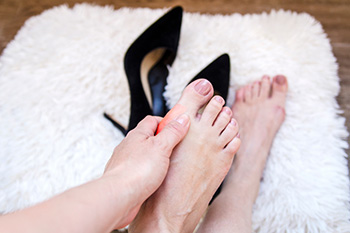
A recent study shows that nearly 40 percent of women wear high heels every day. However, this fashion choice comes at a cost, with 75 percent of these women reporting regular foot pain and various foot deformities. The narrow toe box inherent in most high-heeled shoes is believed to be the main cause. This constrictive design makes it challenging for women to comfortably fit their entire foot into the shoe, leading to toe deformities, such as bunions, hammertoes, and calluses. While heredity plays a large role in the formation of a bunion, external pressure from shoes with a small toe box can make it worse. When conservative measures fail, surgery may be necessary to realign the joint and distribute weight more evenly across the foot. High heels also bend the toes upward, exposing more bone to the bottom of the shoes and causing significant pain. Additionally, the frequent use of high heels is linked to tight calf muscles, which pave the way for other painful foot problems like plantar fasciitis, flat feet, and Achilles tendonitis. For help with any of the above mentioned foot problems, it is suggested that you schedule an appointment with a podiatrist for an exam and treatment options.
High heels have a history of causing foot and ankle problems. If you have any concerns about your feet or ankles, contact David K. Morris, DPM from Florida. Our doctor can provide the care you need to keep you pain-free and on your feet.
Effects of High Heels on the Feet
High heels are popular shoes among women because of their many styles and societal appeal. Despite this, high heels can still cause many health problems if worn too frequently.
Which Parts of My Body Will Be Affected by High Heels?
- Ankle Joints
- Achilles Tendon – May shorten and stiffen with prolonged wear
- Balls of the Feet
- Knees – Heels cause the knees to bend constantly, creating stress on them
- Back – They decrease the spine’s ability to absorb shock, which may lead to back pain. The vertebrae of the lower back may compress.
What Kinds of Foot Problems Can Develop from Wearing High Heels?
- Corns
- Calluses
- Hammertoe
- Bunions
- Morton’s Neuroma
- Plantar Fasciitis
How Can I Still Wear High Heels and Maintain Foot Health?
If you want to wear high heeled shoes, make sure that you are not wearing them every day, as this will help prevent long term physical problems. Try wearing thicker heels as opposed to stilettos to distribute weight more evenly across the feet. Always make sure you are wearing the proper shoes for the right occasion, such as sneakers for exercising. If you walk to work, try carrying your heels with you and changing into them once you arrive at work. Adding inserts to your heels can help cushion your feet and absorb shock. Full foot inserts or metatarsal pads are available.
If you have any questions please feel free to contact our office located in Plantation, FL . We offer the newest diagnostic and treatment technologies for all your foot and ankle needs.



